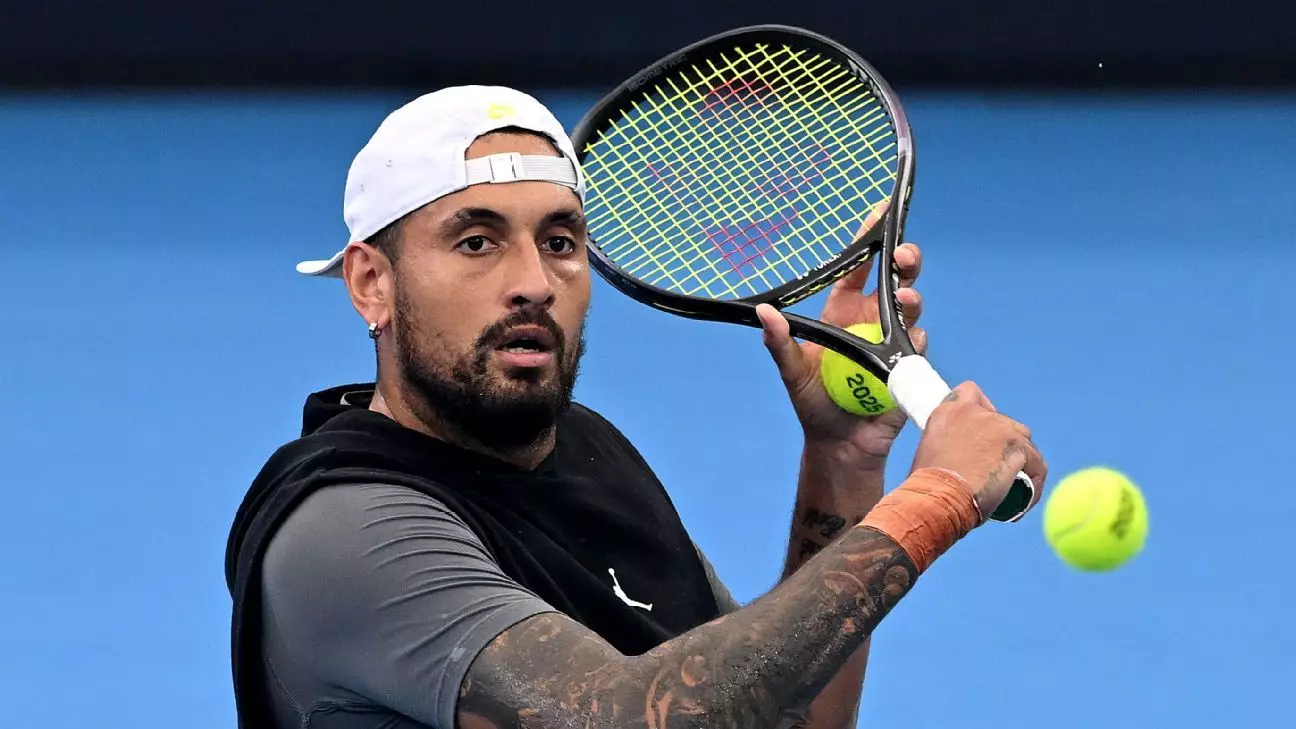Tennis, often revered for its etiquette and tradition, finds itself in the spotlight with the return of the notoriously candid and unpredictable figure, Nick Kyrgios. As the Australian Open approaches, all eyes are on Kyrgios, who prepares to make his Grand Slam comeback after a two-year hiatus from major tournaments. The discussions around his presence raise a significant question: is Kyrgios’s unorthodox style and controversial persona beneficial for the sport of tennis?
Kyrgios’s engagement with tennis often transcends his athletic prowess, veering into the realm of theatrical performance. He characterized the essence of sport as a stage filled with vivid personalities. “We watch sport because we want personalities. It’s like drama, theater,” he remarked, seamlessly blending self-awareness with ego. His anticipation of rejoining the competitive circuit is palpable, especially as he faces physical setbacks, including an abdominal injury. With only two matches under his belt in the previous year, the uncertainty surrounding his fitness adds further intrigue to his upcoming performances.
Moreover, how Kyrgios reintegrates into the tour does not merely hinge on his skills but also his ability to captivate audiences. He thrives on unpredictability, often leaving spectators questioning the potential outcomes of his matches due to his propensity for controversy. Whether he will invoke admiration or ire remains a tantalizing dilemma, resonating with fans and critics alike.
Despite the mixed feelings his character instills within the tennis community, there is no denying that Kyrgios is far from mundane. From spectacular serves to audacious shots, his on-court antics have shifted the dynamics of traditional tennis matches. The athlete is as likely to engage in fierce exchanges with officials or audiences as he is to display moments of brilliance through his gameplay. Notably, his previous legal woes—specifically a guilty plea for an altercation with a former partner—have not dulled the fascination with his persona. If anything, these events contribute layers to his public image, making him one of the most talked-about figures in sports.
Yet, Kyrgios challenges the boundaries of acceptable dialogue within tennis. He is unafraid to address contentious issues like doping, often sparking backlash from peers and authorities. “I know that people don’t like when I just speak out about things,” he admits, revealing a self-awareness that speaks volumes about his character. This inclination to voice his opinions, regardless of potential fallout, positions him as both a disruptor and an advocate, creating ripples in the sport’s conservative core.
The path leading up to Kyrgios’s participation carries significant weight, both for him and the broader tennis world. Colleagues like Daniil Medvedev recognize that a physically fit Kyrgios could be a game-changer, a player capable of challenging the likes of rising stars such as Carlos Alcaraz and Jannik Sinner. Medvedev’s reflection underscores a larger sentiment within the sport: Kyrgios’s talent has the potential to not only elevate his own game but enrich the competitive landscape of tennis as a whole.
His last major engagement before this tournament was the 2022 US Open, where he basked in the glory of reaching the quarterfinals. Recently, at the Brisbane International, he made a brief return, engaging not just in singles but teaming up with tennis heavyweight Novak Djokovic for doubles. Such partnerships highlight the level of recognition and respect Kyrgios commands from his peers, even amid turmoil.
As Kyrgios steps back into the spotlight of the Australian Open, his role in the sport cannot be understated. For every critic that desires the eradication of flamboyance in tennis, there are fans who crave the excitement he injects into every match. His ability to create drama, evoke emotion, and challenge the status quo serves not only to entertain but also to prompt necessary discussions about the evolving nature of tennis.
Indeed, Kyrgios embodies a complex duality—he is both a champion and a contentious figure. While he may not be everyone’s cup of tea, there is consensus on one issue: his presence in the tennis world stirs a pot that often risks becoming bland. Whether one views him as a hero or a villain, Kyrgios indelibly marks the sport as it continues its path into the future. The Australian Open may only be the beginning for an athlete who seems determined to rewrite the narrative of what it means to be a professional tennis player.

